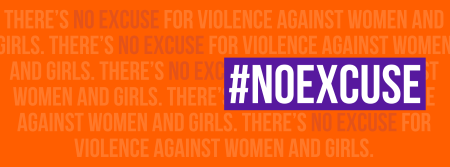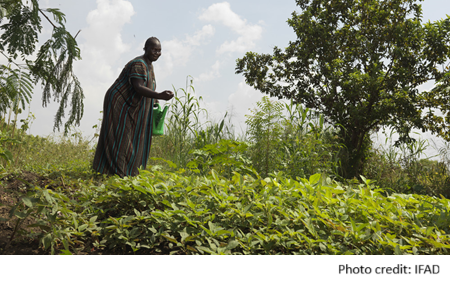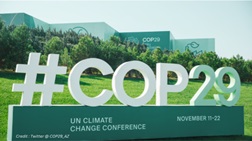Have you ever thought of water as a feminist issue?
When women and girls have to spend many hours each day collecting water for their families it is harder for them to go to school or work or to participate fully in their communities. Tanzanian water engineer, Immaculata Raphael, believes that bringing water to rural villages is "100 percent feminist".
Click here to read more about how access to water impacts the daily lives of women in rural Tanzania, and go on a virtual trip to the Geita region by listening to the CBC radio documentary "The Water Carriers" about how access to clean water has "uplifted" women and girls, thanks to a project funded in part by Global Affairs Canada.
For the past 16 days, GRANs across the country have been participating in the worldwide "Orange Campaign," standing in solidarity with women's rights defenders around the world who work tirelessly to bring an end to violence against women. Check out our photo gallery to see many of the ways GRAN members "oranged" their towns and cities to raise awareness and engage their communities.
As this year's Campaign comes to a close, we take the opportunity to honour the work of Aissa Doumara Ngatansou of Cameroon whose own life experiences motivated her to co-found a regional centre to help women and girls affected by gender-based violence. Click here to read Aissa's story.
December 1, 2018 marks the 30th anniversary of World AIDS Day. In 30 years the world has made considerable progress in the fight against HIV/AIDS, but the epidemic is not over. What more is to be done?
According to Dr. Naoko Yamamoto, Assistant Director-General for Universal Health Coverage and Health Systems with the WHO,
“The future of the HIV response will require looking beyond HIV care provision and ensuring that the disease response is embedded in universal health coverage. Ending AIDS is unlikely to ever happen without integrated health systems that provide HIV prevention, diagnosis, and treatment, as well as care, with other essential health services and support to other co-morbidities such as TB, non-communicable diseases, and mental health at the community level. A people-centred, human rights based and holistic approach is crucial.”
For a thorough and informative walk through the developments in the global HIV/AIDS response over the past 30 years and a vision for the next 12 (taking us to 2030), please click here to read the World Health Organization's online article: "Why the HIV epidemic is not over".
On November 25 the world marks International Day for the Elimination of Violence against Women. And with it, we enter into the 16 Days of Activism Against Gender-Based Violence, culminating on International Human Rights Day on December 10. GRANs across the country are “Oranging” their communities to help raise awareness.
"This year’s United Nations theme for the International Day for the Elimination of Violence against Women is “Orange the World: #HearMeToo”. It aims to honour and further amplify voices, whether a housewife at home, a schoolgirl abused by her teacher, an office secretary, a sportswoman, or a boy who is an intern in a business, bringing them together across locations and sectors in a global movement of solidarity. It is a call to listen to and believe survivors, to end the culture of silencing and to put the survivors at the centre of the response. The focus must change from questioning the credibility of the victim, to pursuing the accountability of the perpetrator." -- Phumzile Mlambo-Ngcuka, UN Under-Secretary-General and Executive Director of UN Women
You can read (or watch) Phumizile Mlambo-Ngcuka’s full message by clicking here.
#HearMeToo brings to the forefront the voices of women and girls who have survived violence, who are defending women’s rights every day, and who are taking action — many of them very far away from the limelight or media headlines. Their voices and stories need to be heard too. Click here to read moving personal #HearMeToo stories from Africa.
Consider sharing this post with others via social media using #HearMeToo and #orangetheworld! UN Women has come up with a “Twibbon” that allows you to show support by “Oranging” your profile picture on Facebook and Twitter. Click here if you’d like to “Orange” yourself over the next 16 Days!
GRAN advocates in Kawartha Lakes, ON are proud to be living in a region which is taking its place alongside other locales worldwide to “Orange the World” and galvanize action to end violence against women and girls both at home and around the world.
Read here how GRANs in the City of Kawartha Lakes will be lighting up their community with "Orange" awareness during the 16 Days of Activism Against Gender-Based Violence.
Zimbabwe’s grandmothers are providing mental health support in their communities through a remarkable program called “The Friendship Bench”. Since 2006, over 400 Zimbabwean grandmothers have been trained in talk therapy, which they deliver for free in more than 70 communities across Zimbabwe.
Grandmother Chinhoyi, who has been with the Friendship Bench program for over ten years, helps others on an almost daily basis. She regularly meets with HIV-positive individuals, drug addicts, people suffering from poverty and hunger, unhappy married couples, lonely older people, and pregnant unmarried young women. Regardless of their background or circumstances, she begins her sessions the same way: “I introduce myself and I say, ‘What is your problem? Tell me everything, and let me help you with my words."
You can read more about the work of Zimbabwe’s counsellor-grandmothers and how this remarkable program began by clicking here.
We are now just one month away from the beginning of the 16 Days of Activism Against Gender-based Violence, marked annually around the world under the theme of “Orange the World”. As we get closer to the Days of Activism, we are inspired by stories of those working daily to raise awareness and prevent violence against women and girls.
One such human rights defender is Faidah Suleiman, Superintendent of Police, Gender and Children’s Desk in Tanzania, and member of the national Female Police Network. She shares, “Being a police officer and being a gender specialist enabled me to help not only my mother, but others in my family too. … I’m proud that through my job I’m making changes in my family and in the society.”
To read more of Faidah’s story click here.
To read more about the UN’s Orange Campaign and GRAN’s goals for this year’s campaign, click here.
Pensions for older women and men are the most widespread form of social protection around the world. However, according to the most recent World Social Protection Report issued by the International Labour Organization, only 29.6% of seniors across Africa receive some form of old-age pension. The lack of social protection for the majority of older people across the continent leaves many vulnerable to poverty, inequality, and social exclusion.
And yet, statistics don’t tell the whole story. There is also good news and reason to celebrate. This year Kenya instituted a universal pension for its citizens over the age of 70, the new program fully owned and funded by the national government.
Read more about Kenya’s leadership on pensions by clicking here.
October 11th is marked each year by the United Nations to highlight and address the needs and challenges girls face, while promoting girls' empowerment and the fulfillment of their human rights.
Recently Canada showed leadership in the area of girls’ education by co-hosting a high-level UN event entitled, “12 Years to Break Barriers and Leave No Girl Behind”.
In his opening remarks, Canada’s Prime Minister Justin Trudeau highlighted the necessity of accelerated action on girls’ education. “For each Malala that we know, there are thousands of others that we don’t know….We must work with them…. We must give them the ability to be successful,” he urged. The event culminated in the commitment of over 500 stakeholders -- including governments, leading multi-lateral agencies, and civil society organizations -- to take concrete action to dismantle barriers and increase access to education for girls, with a special focus on those who are marginalized. Click here to read the specifics in the joint commitment and call to action.
Monday, October 1, is the International Day of Older Persons. The day is an opportunity to reflect on the rich contributions seniors have made and continue to make to society.
As we celebrate older persons around the world, we cannot forget that too many are forgotten and left behind. Inequalities remain a major obstacle to improving the lives of older persons, particularly older women.
But there is cause for celebration and hope. This past July, the United Nations member states began discussing the rights of older persons, renewing calls for a convention on older people’s rights.
For more on this remarkable development and Canada’s position: Click here
Pages


